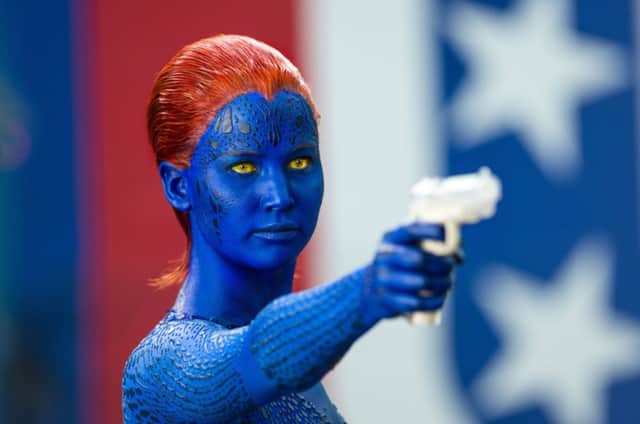Film review: X-Men: Days of Future Past


That film was designed to reboot a saga that had gone into a creative tailspin with the rubbish (albeit profitable) X-Men: Last Stand, and the abysmal X-Men Origins: Wolverine. It worked too; with the younger cast – which included Jennifer Lawrence – bringing a real freshness to the concept, and the goofy real-world plot (it was set against the backdrop of the Cuban Missile Crisis) giving it a pulpy resonance.
After last year’s redundant intermedite film, The Wolverine, the good news about the new film is that it once again provides the series with a much-needed shot in the arm, even if the colliding universes plot takes some explaining and risks alienating casual viewers who perhaps might not remember that Ellen Page co-starred in X-Men: Last Stand (the third film) as Kitty Pryde, a mutant with mind-controlling powers that allow her to warp time; or that Patrick Stewart’s Professor X was killed off (but not really) in the same movie. Beginning roughly ten years on from the events of The Wolverine (or eight if you stayed to watch that film’s post-credits stinger), the film doesn’t really bother to fill in any blanks, dropping us instead into a ruined future in which giant robots known as Sentinels have destroyed civilization and are systematically hunting down the surviving mutants.
Advertisement
Hide AdAfter an opening salvo of baffling battle sequences, some clarifying exposition eventually emerges with the arrival of Wolverine (Jackman), Professor X and Magneto (McKellan), the enmity between the latter pair having long since disappeared now that they’re united in a common cause to prevent their own extinction. In the manner of The Terminator, they’ve identified the historical schism that set the world down its current path and need Kitty Pryde to send Wolverine’s mind back to his 1973 body in order to prevent the blue-skinned Mystique (Lawrence) from assassinating Dr Bolivar Trask, a mutant-fearing scientist played by Peter Dinklage (riffing on his Game of Thrones disreputability) whose work will lead to the creation of the Sentinels – but only after Mystique kills him.
The complications that Singer and screenwriter Simon Kinberg pile on don’t end there, but luckily, once Wolverine is back in the 1970s – decked out in fly gear from the period; his strut sound-tracked by a wah-wah guitar – a sense of fun starts to pervade proceedings. As does some compelling drama, thanks largely to the arrival of James McAvoy’s Charles Xavier (Patrick Stewart’s younger self). Almost single-handedly saving X-Men: Days of Future Past from disappearing down its own wormhole, McAvoy is brilliant here, playing Charles initially as a sort of junkie recluse, his long straggly hair, ginger beard and haunted eyes suggesting a sort of burned-out rock star cousin to Filth’s Detective Bruce Robertson. With Charles once again able to walk thanks to a serum that corrects his spine but dulls his telepathic powers, McAvoy has a real conflict to play with and, along with Lawrence (whose character finds herself hunted by the humans she fears and the mutants she used to trust) emerges as the true star of the film, certainly much more so than Fassbender, whose Magneto – banged up after being implicated in the Kennedy assassination (a tasteless, but kind of fun detail) – has a less compelling storyline than he did in First Class.
Action-wise Singer eventually succumbs to the usual building destroying mayhem, but before he does, he stages two brilliant sequences early on – one using Zapruder-style home movie footage; the other shot in super slow-motion – that rank among the best set-pieces in any of these types of films. He also manages to keep things hurtling along at enough of a clip to prevent the brain-aching plot mechanics from overwhelming proceedings too much. Even so, as with any time travel film there are some gaping plot holes and time paradoxes, although the oddest thing here is to leave the cinema realising that the action of this one renders the other films in the saga (even the good ones) meaningless.
Maybe there’s a metaphor in there somewhere about the way Hollywood treats its recent past, or maybe it’s just doing what comic books have always done: make up the rules as they go along.